The morning after the White Witch fiasco-or maybe later that day-Caspian sits atop the entrance to Aslan’s How, staring at the misty landscape below. Honestly, I wish this were a real place so that I could sit there and do the same. But enough of me praising the art direction.
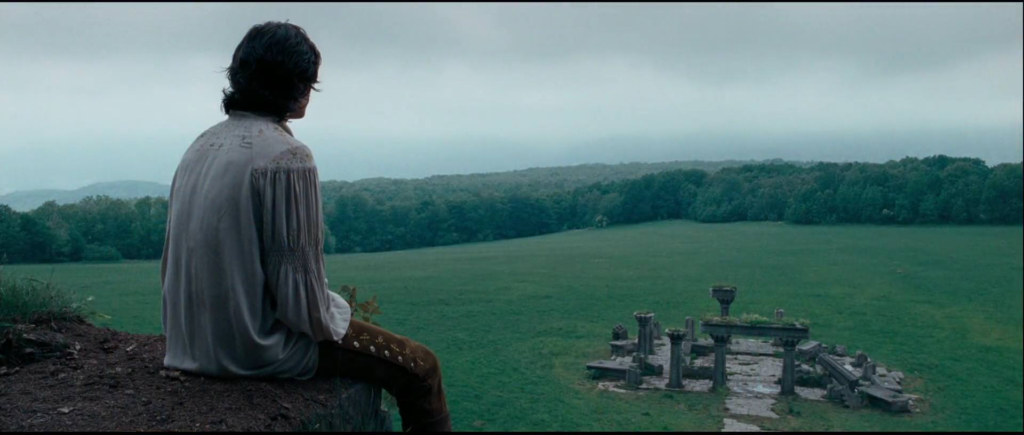
Dr. Cornelius comes out of the How and wordlessly sits next to him.
Caspian: Why did you never tell me about my father?
Cornelius: My mother was a black dwarf from the northern mountains. I risked my life all these years that someday you might be a better king than those before you.
Caspian: Then I have failed you.
Cornelius: Everything I told you, everything I didn’t, it was only because I believe in you. You have the chance to become the most noble contradiction in history. The Telmarine who saved Narnia.
I don’t really see the connection between Caspian’s initial question and the revelation about Dr. Cornelius’s heritage. And the bit about “everything I told you, everything I didn’t” is a bit weak too. How would telling Caspian the truth about his father’s death be a bad influence on him? But other than that, this is a lovely scene and not just because of the acting though Ben Barnes and Vincent Grass give beautiful performances. The line about “the most noble contradiction in history” is one of the best quotes from a Narnia movie that isn’t taken from the books.
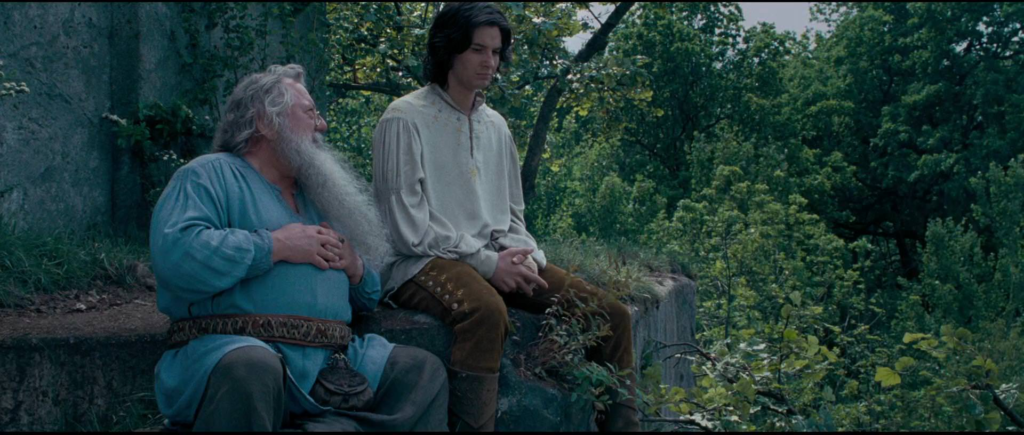
Within the How, Peter is also staring wistfully at something. Rather than staring down at something though, he’s staring up at the image of Aslan in the Stone Table room. Lucy, like Dr. Cornelius, wordlessly approaches and sits by him. There’s some nice acting from William Moseley as he thinks about what he’s going to say to her before he says it. “You’re lucky, you know,” is what he says, “To have seen him. I wish he’d just given me some sort of proof.” Peter’s voice sounds less bitter towards Aslan now and more desperate. There still might be a little bit of bitterness but that serves to make the scene more interesting. “Maybe we’re the ones who need to prove ourselves to him,” Lucy suggests, massaging Peter’s arm to comfort him.
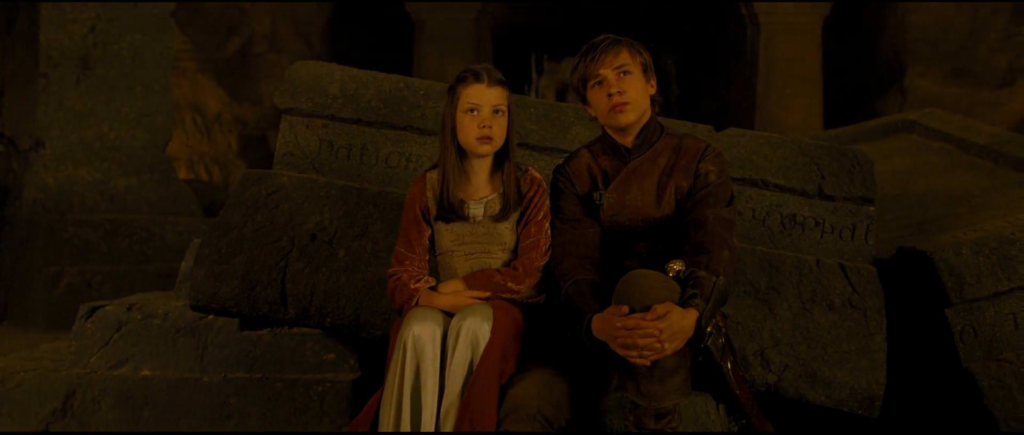
Now there are some people out there, mainly fans of the Narnia books,[1]Not every fan of the books of course. who condemn this movie as being nothing but empty action scenes. I was prepared to defend it against those charges, using these two quiet dialogue scenes. However, I realized with a start that these scenes are both very short whereas the movie’s action scenes are quite lengthy. Still, I’m going to stick to my defense since these two scenes are still very emotional and even a little thoughtful. Also, while we’ll be getting a major action scene soon, there will be a handful of dialogue/action scenes leading up to it. And, hey, action scenes aren’t enemies to character development and good storytelling. Both the attack on the castle and the White Witch scene were action scenes which were also very concerned with furthering character arcs. Mind you, I didn’t love everything about how they furthered character arcs since I think the arc the movie gives Peter needed some ironing and the arc it gives Caspian is dull but it’s slander to say the movie isn’t interested in story and character. I’m going to quote from An Experiment in Criticism, a nonfiction work of C. S. Lewis. In it, he partly defends the “unliterary,” by which he means those who just read books for exciting plots and wish fulfillment, not to appreciate the style.
Let us be quite clear that the unliterary are unliterary not because they enjoy stories in these ways, but because they enjoy them in no other. Not what they have but what they lack cuts them off from the fulness of literary experience. These things ought they to have done and not left others undone. For all these enjoyments are shared by good readers reading good books. We hold our breath with anxiety while the Cyclops gropes over the ram that bears Odysseus, while we wonder how Phèdre (and Hippolyte) will react to the unexpected return of Thésée, or how the disgrace of the Bennet family will affect Darcy’s love for Elizabeth. Our inquisitiveness is strongly excited by the first part of The Confessions of a Justified Sinner or the change in General Tilney’s behaviour. We long to discover Pip’s unknown benefactor in Great Expectations. In Spenser’s House of Busirane every stanza whets our curiosity. As for the vicarious enjoyment of imagined happiness, the mere existence of the Pastoral gives it a respectable place in literature. And elsewhere too, though we do not demand a happy ending to every story, yet when such an ending occurs and is fitting and well executed, we certainly enjoy the happiness of the characters. We are even prepared to enjoy vicariously the fulfilment of utterly impossible wishes, as in the statue scene from the Winter’s Tale; for what wish is so impossible as the wish that the dead to whom we have been cruel and unjust should live again and forgive us and ‘all be as before’? Those who seek only vicarious happiness in their reading are unliterary; but those who pretend that it can never be an ingredient in good reading are wrong.
C. S. Lewis also criticized movie adaptations of literature for adding action scenes, so he’d doubtless dislike the 2008 Prince Caspian. But I think the argument he makes could very well be used in the film’s defense. Action scenes shouldn’t be the raison d’etre of a movie-or not of a Narnia movie anyway. But they can still be an ingredient in it.
Speaking of movies, let’s get back to the plot. Edmund enters and tells Peter he’d better come quickly. The Pevensies rush out of one of the How’s many entrances to stand beside Caspian. The Telmarine army, led by Miraz, emerge from the trees. And they’ve got catapults.
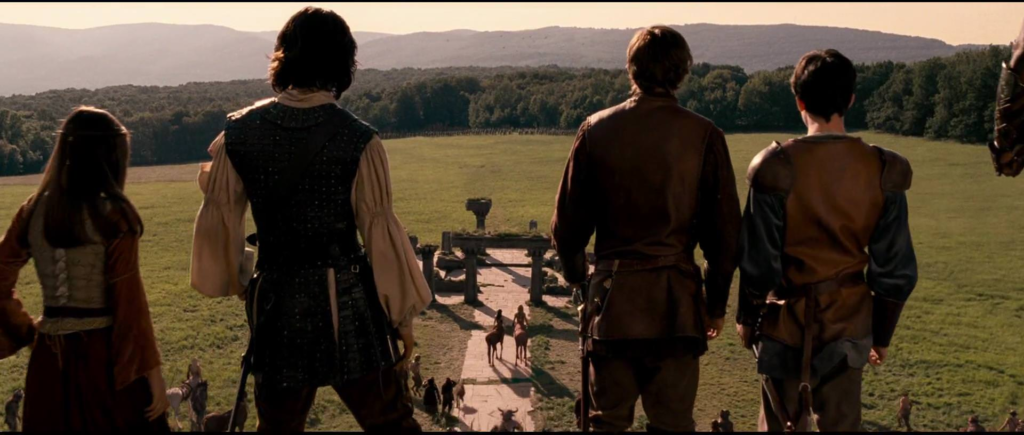
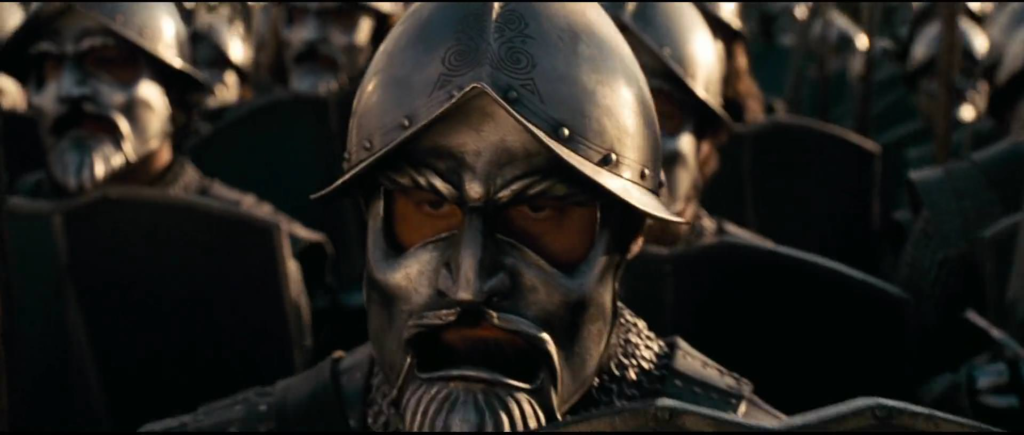
In better news, I was wrong when I claimed that “Beards and bedsteads” was the only one of Trumpkin’s characteristic exclamations from the book to make into the movie. We cut to another of the Narnians and hear him say, “Cakes and Kettledrums![2]Actually, in the book, it was “Cobbles and kettledrums” but never mind. That’s your next big plan?! Sending a little girl off into the darkest parts of the forest alone?!” “It’s our only chance,” insists Peter. “And she won’t be alone,” adds Susan. The little girl is obviously Lucy but why is their only chance sending her into the darkest parts of the forest? The scene doesn’t really explain. You sort of have to watch the movie twice to figure it out. As I wrote before, this would make so much more sense if Aslan had told Lucy in her dream to come meet him somewhere. “Haven’t enough of us died already?” Trumpkin asks with an uncharacteristic stutter in his voice, looking like he might very well break down crying.
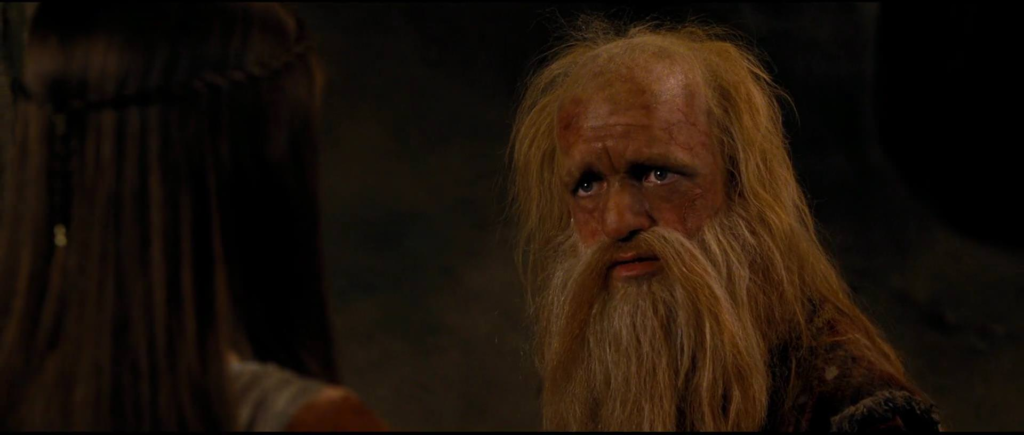
“Nikabrik was my friend too,” says Trufflehunter, “but he lost hope. Queen Lucy hasn’t. And neither have I.” Reepicheep draws his sword in a salute. “For Aslan,” he says solemnly. “For Aslan,” intones a nearby talking bear (voiced by David Walliams.) In the book, the Bulgy Bear is a major source of comic relief. I imagine the filmmakers trimmed his part because they wanted this to be a serious action movie with no comedic talking bears in it. Humph, I say! But that makes it rather odd that they’d give the character this one line in a big dramatic scene.[3]It may strike some as even odder that they’d bother to hire Walliams, a professional actor, rather than give one of the crew a vocal cameo as they did for, say, Pattertwig, another minor … Continue reading
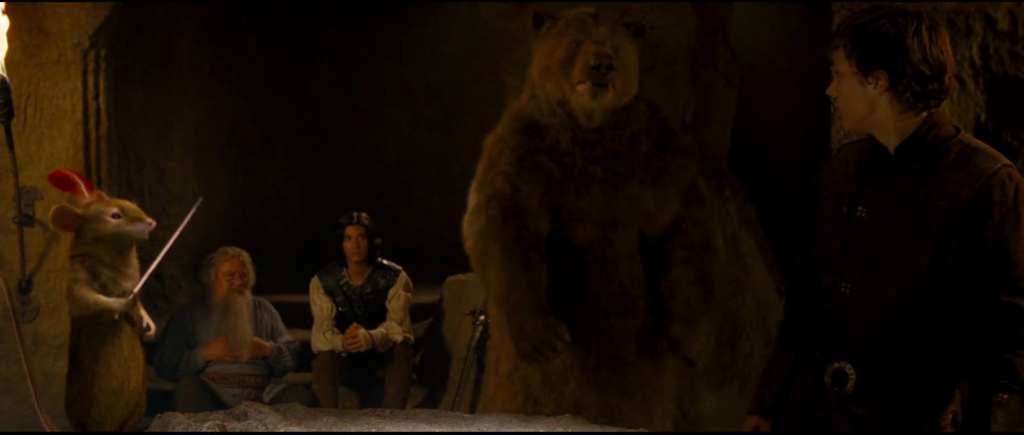
Back to the scene. “Then I’m going with you,” says Trumpkin to Lucy. “No, we need you here,” she replies, putting a hand on his shoulder. “We have to hold them off until Lucy and Susan get back,” says Peter. “If I may…,” says Caspian. Instead of getting told off by Peter, Caspian receives everybody’s attention. “Miraz may be a tyrant and a murderer but as king, he is still subject to the traditions and expectations of his people. There is one in particular that may buy as some time.”
Later, Miraz and Glozelle watch from afar as Edmund and two Narnians approach with green branches, the equivalent of olive branches or white flags in this culture. “Perhaps they have come to surrender,” Glozelle suggests. “No. They are much too noble for that,” says Miraz. The two Narnians are the same ones that accompany Edmund in the book, Glozelle and Wimbleweather the giant (Jan Filipensky.) Wimbleweather is another major source of comic relief in the book who is sadly reduced to a cameo here. Perhaps this is partly because giants are expensive. If so, I wonder how the filmmakers intended to adapt The Silver Chair, a Narnia book in which giants play a big role. Still, this cameo is better than nothing.
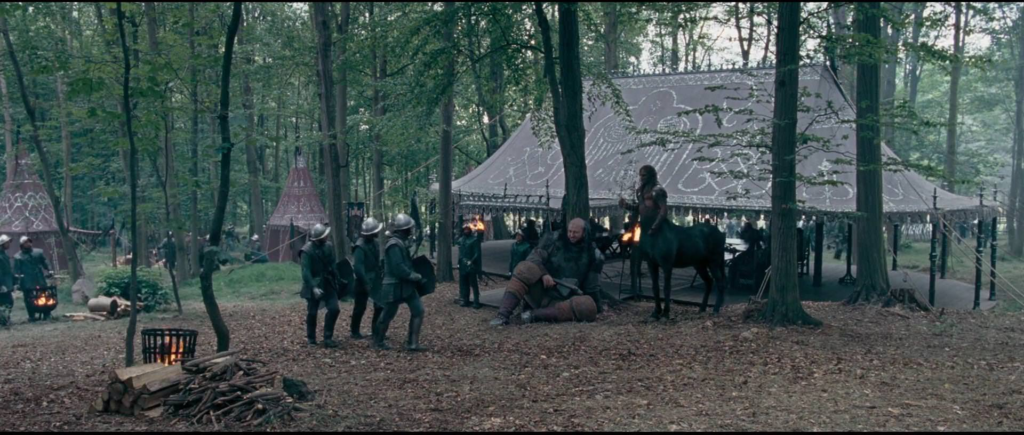
We cut to Edmund reading a challenge to Miraz and other Telmarine bigshots. The language of the challenge, I’m pleased to relate, is close to the book though it’s much shorter and easier for people not versed in this kind of culture to understand. “I, Peter, by the gift of Aslan, by election and by conquest High King of Narnia, Lord of Cair Paravel and Emperor of the Lone Islands, in order to prevent the abominable effusion of blood do hereby challenge the usurper Miraz to single combat upon the field of battle. The fight shall be to the death. The reward shall be total surrender.”
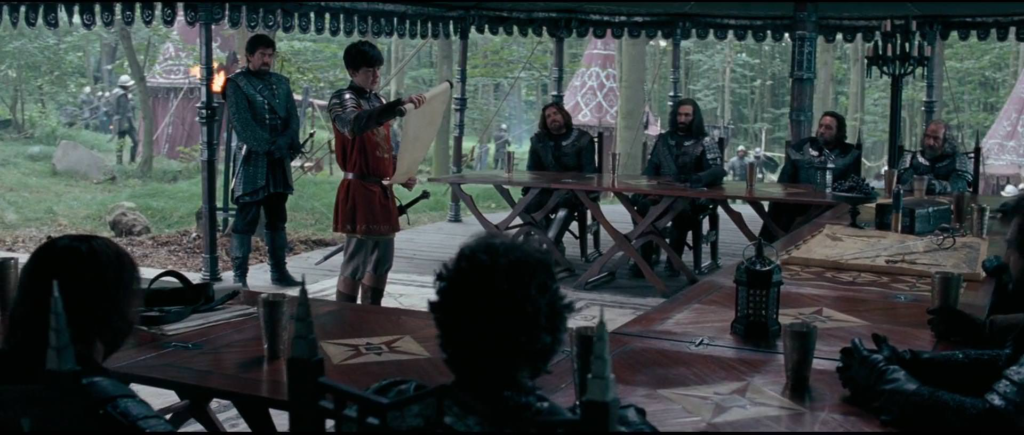
“Tell me, Prince Edmund-” begins Miraz, sounding unimpressed, before Edmund interrupts to clarify that he’s actually King Edmund. “Just king though. Peter’s the high king. I know, it’s confusing.” Some fans might reasonably object that that moment of humor has undertones of criticizing the source material. For what it is though, it can be enjoyed. The movie’s comedic timing is very good.
Miraz: Why would we risk such a proposal when our armies could wipe you out by nightfall?
Edmund: Haven’t you already underestimated our numbers? I mean, only a week ago Narnians were extinct.
Miraz (grimly): And so you will be again.
Edmund: Then you should have little to fear.
Miraz laughs at this, not a stereotypically evil sounding laugh, a genuinely amused one. “This is not a question of bravery,” he says. “So you’re bravely refusing to fight a swordsman half your age?” says Edmund. Miraz’s smile freezes. He leans forward and says in a much less relaxed tone of voice, “I didn’t say I refused.” Sergio Castellitto is so great in this role!
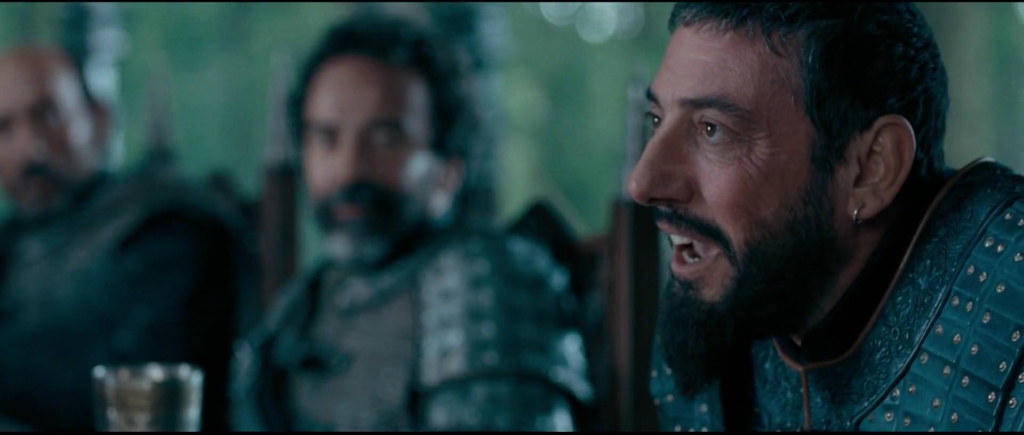
“You shall have our support, Your Majesty, whatever your decision,” one of the Telmarine lords (David Bowles) says. “Sire,” says Lord Sopespian smoothly, “our military advantage alone provides the perfect excuse to avoid what might otherwise be-” Miraz jumps to his feet, drawing his sword. “I am not avoiding anything!” he snarls. It’s as fun to see him nettled as it was not fun to see Caspian and Peter nettled earlier. “I am merely pointing out that my lord is well within his rights to refuse,” says Sopespian innocently. “His Majesty would never refuse,” puts in Glozelle. “He relishes the chance to show the people the courage of their new king.” This is a minor change from the book’s story that I think arguably improves upon it. As C. S. Lewis wrote the scene, Glozelle and Sopespian manipulate Miraz into accepting Peter’s challenge for purposes of their own in the exact same way. Having one of them act like of course he wouldn’t accept and the other act like of course he wouldn’t decline makes the scene interesting.

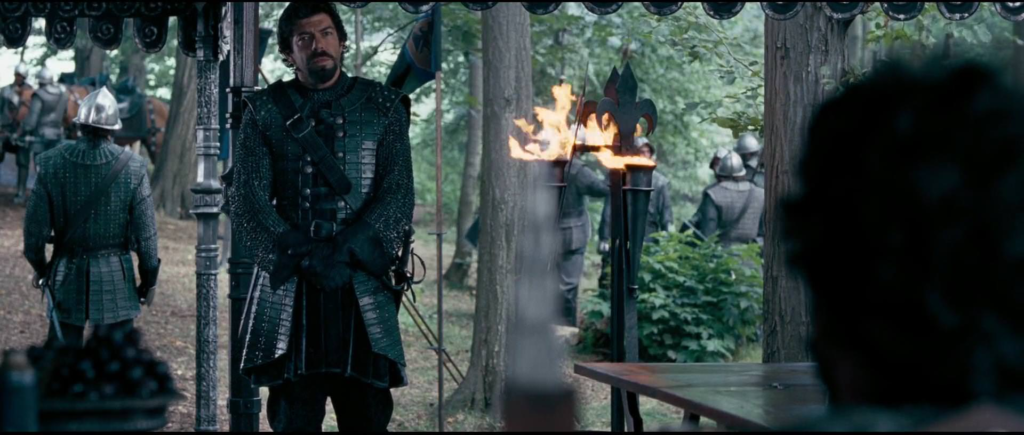
Miraz’s eyes dart around as he realizes he’s trapped but he manages to keep from looking too helpless. “You,” he says, pointing his sword at Edmund[4]You’ll notice it trembles a bit., “you should hope your brother’s sword is sharper than his pen.” Fortunately, Edmund has a great poker face.
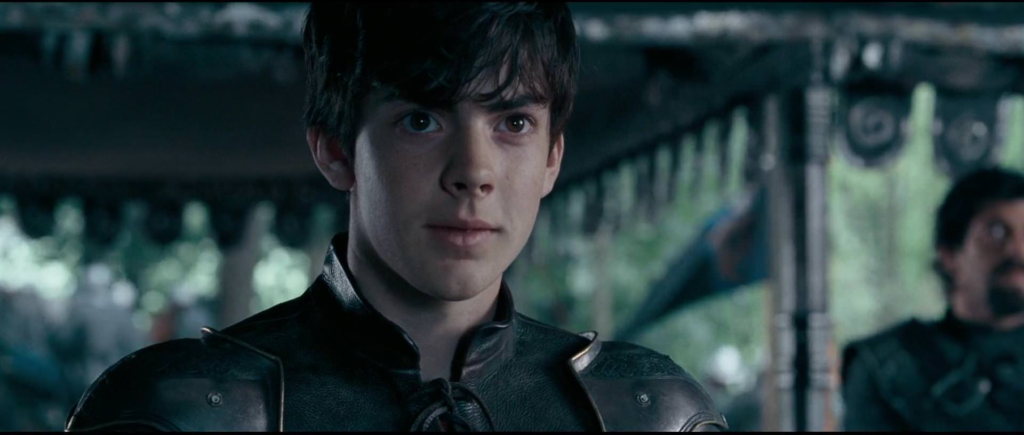
Now I’m going to write about a deleted scene in some detail[5]I’m actually not sure whether it would have come here or after the next scene. because in my opinion, it most definitely should not have been deleted! And I’m not just saying that because much of it is from the book. OK, I’m mostly saying it because of that. But even with the story the filmmakers were telling, the scene would have improved the storytelling. It would have begun with Caspian respectfully arguing that he, not Peter, should be the one to fight Miraz and Peter disagreeing.
Peter (kindly): Look, if there’s ever going to be peace with the Telmarines, you have to be the one who brings it.
Caspian: How can I if you won’t let me?
Peter: Not like this. If I don’t make it, well, Narnia’s future’s in your hands.
Caspian: And what about your own future?
Peter: I was thinking about a career in medicine.
As it is, the idea that Caspian’s goal should be uniting the Telmarines and the Old Narnians comes rather out of nowhere at the climax of the story. This dialogue would have served to set it up.[6]OK, it would be setting it up right before the climax but that’s still better than not setting it up at all. This also would have made Peter and Caspian’s relationship less unpleasant. Peter would have given Caspian good advice and acknowledged him as his successor. Caspian would have expressed concern for Peter’s safety. These strike me as important beats for their character arcs without which the movie suffers dramatically. The scene would have gone on to show Peter picking his marshals of the list for the duel. The Bulgy Bear would have invoked his species’ ancient right to provide one of them and Trumpkin objecting that he’d end up sucking his paws and embarrassing the Narnians. Reepicheep would have also volunteered, and Peter would have come up with a diplomatic reason for declining the offer rather than saying, “The enemy would have laugh at you because you’re so small.” These humorous moments from the book weren’t important character beats but come on! It’s classic stuff! Earlier in this post, I defended the movie against charges it favored action above all else, using this talky section as a counterargument. But the fact that the scene I just described was deleted while the climactic battle, to which we’ll get in the next post, drags on and on weakens my case.
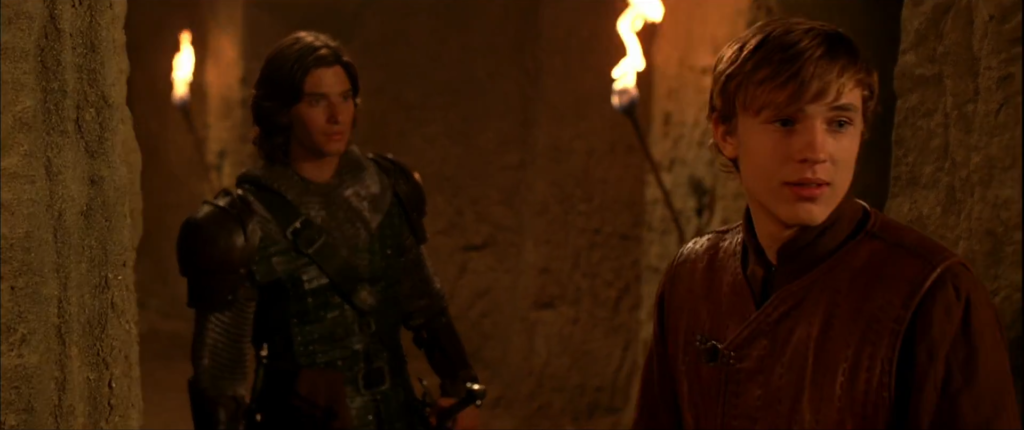
Back at the How, Caspian helps Susan and Lucy mount his horse. “Destrier has always served me well,” he says, “You are in good hands.” “Or hooves,” jokes Lucy. (Not one of the movie’s better jokes but it feels like something someone would say in real life.) “Good luck,” says Caspian, trying to meet Susan’s eye. She says, “Thanks,” but coldly turns her face away. Caspian apologetically hands her the enchanted horn, saying maybe it’s time she had it back. Now Susan manages a small smile. “Why don’t you hold on to it?” she says. “You might need to call me again.” She gallops off. “You might need to call me again?!” Lucy repeats incredulously. “Oh, shut up!” says Susan. I’m with Lucy here. Was that a cell phone joke? That makes no sense! Neither Susan nor Caspian comes from a world with cell phones. What were the writers thinking?!

We cut to Peter emerging from Aslan’s How for the duel. The Narnians cheer for him while the Telmarines cheer for Miraz. In a nice touch, Peter wears armor nearly identical to what he wore in The Lion, the Witch and the Wardrobe (2005.) This is appropriate since he’s one of Old Narnia’s greatest heroes, if not the greatest, come from the ancient past to do battle for it but the gambeson(?)[7]I googled “cloth part of armor” and that’s the word that came up though the images I found weren’t a perfect fit. is a darker shade of red than the one in the first movie, indicating that this is a sadder, wiser Peter.
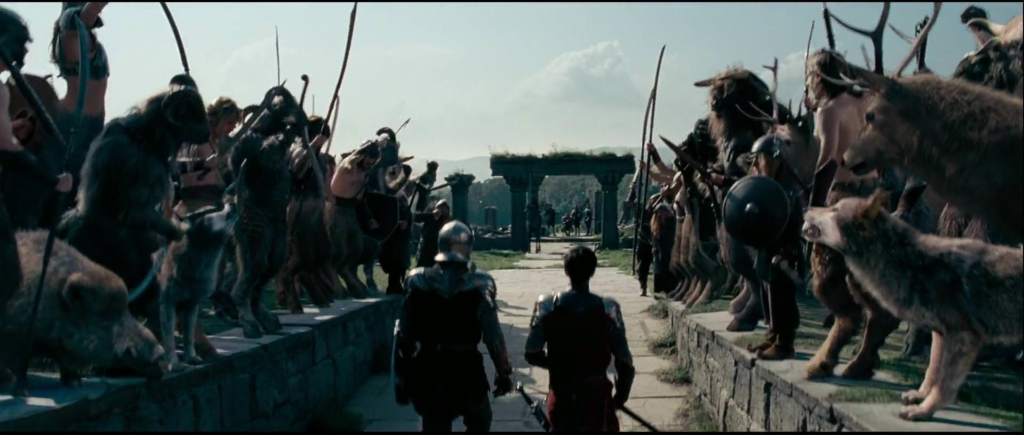
The Narnian marshals of the list are Edmund, Glenstorm and the Bulgy Bear. The Telmarine marshals are Glozelle, Sopespian and that guy who told Miraz he would have their full support whatever they decided.

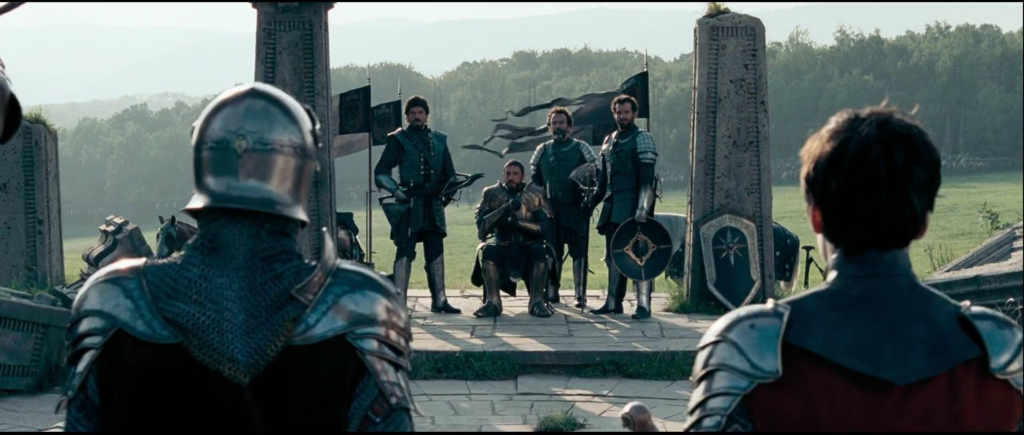
“It should appear to be going badly,” Miraz says in an undertone to Glozelle who holds a crossbow. “Understood, Your Majesty,” says Glozelle. Does this mean that Glozelle is supposed to shoot Peter if it looks like he’s winning? I can’t think what else the implication could be, but I don’t quite get the line. Shouldn’t it be “if it should appear to be going badly?” Adding that one word to the beginning of the sentence would have made it so much clearer.
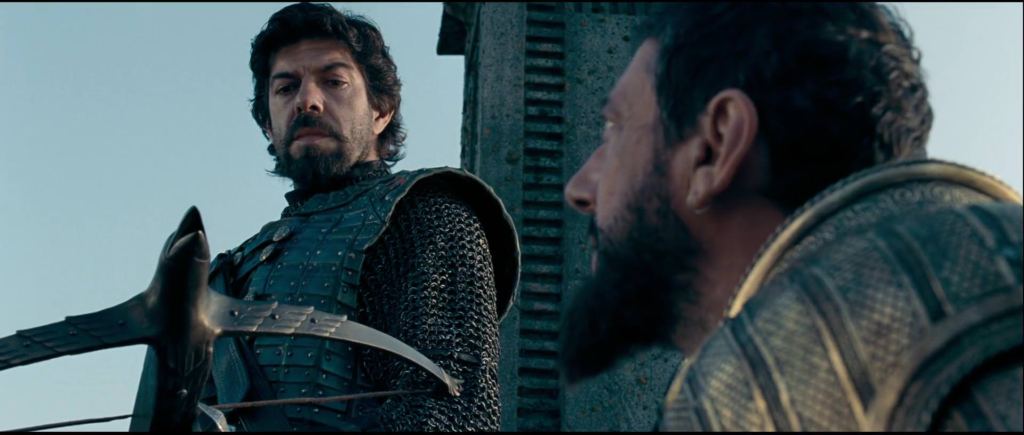
Anyway, unlike in the book, Miraz has no misimpression that Sopespian didn’t really want him to accept this challenge. As he takes his helmet from him, he says, “I hope you won’t be too disappointed when I survive.”[8]Speaking of weapons, here’s something readers will hopefully find funny. The beloved modern fantasy series, His Dark Materials, was intended by its author, Philip Pullman, to be sort of an … Continue reading Peter and Miraz circle each other as both armies watch with bated breath. Then the kings engage in a little trash talk.
Miraz: There is still time to surrender.
Peter: Feel free.
Miraz: How many more must die for the throne?
Peter: Just one.
And they fight.

Next Week: Who Will Win?
References
| ↑1 | Not every fan of the books of course. |
|---|---|
| ↑2 | Actually, in the book, it was “Cobbles and kettledrums” but never mind. |
| ↑3 | It may strike some as even odder that they’d bother to hire Walliams, a professional actor, rather than give one of the crew a vocal cameo as they did for, say, Pattertwig, another minor Narnian speaking part. As I’ll explain in a bit, the bear was originally going to have more lines that were cut, making it a bit more explicable. But even if those had been kept, waiting this long to introduce his character would have been weird. |
| ↑4 | You’ll notice it trembles a bit. |
| ↑5 | I’m actually not sure whether it would have come here or after the next scene. |
| ↑6 | OK, it would be setting it up right before the climax but that’s still better than not setting it up at all. |
| ↑7 | I googled “cloth part of armor” and that’s the word that came up though the images I found weren’t a perfect fit. |
| ↑8 | Speaking of weapons, here’s something readers will hopefully find funny. The beloved modern fantasy series, His Dark Materials, was intended by its author, Philip Pullman, to be sort of an anti-Narnia series since he found those books highly offensive. A year before the cinematic Prince Caspian‘s release, there came a movie adaptation of the first Dark Materials book, The Golden Compass. (Actually, it was only titled The Golden Compass in America, I guess, because that matched the titles of the other books in the series better. In the UK, it was titled Northern Lights.) Some of the villainous Telmarines have what looks like a compass design on their shields. It’s amusing to imagine that this was intended by the filmmakers as a little Take That at their competition though I’m sure that wasn’t the case. |
